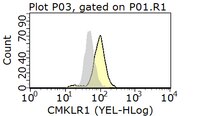Chemokine-like receptor-1 expression by central nervous system-infiltrating leukocytes and involvement in a model of autoimmune demyelinating disease.
Graham, KL; Zabel, BA; Loghavi, S; Zuniga, LA; Ho, PP; Sobel, RA; Butcher, EC
Journal of immunology (Baltimore, Md. : 1950)
183
6717-23
2009
요약 표시
We examined the involvement of chemokine-like receptor-1 (CMKLR1) in experimental autoimmune encephalomyelitis (EAE), a model of human multiple sclerosis. Upon EAE induction by active immunization with myelin oligodendrocyte glycoprotein amino acids 35-55 (MOG(35-55)), microglial cells and CNS-infiltrating myeloid dendritic cells expressed CMKLR1, as determined by flow cytometric analysis. In addition, chemerin, a natural ligand for CMKLR1, was up-regulated in the CNS of mice with EAE. We found that CMKLR1-deficient (CMKLR1 knockout (KO)) mice develop less severe clinical and histologic disease than their wild-type (WT) counterparts. CMKLR1 KO lymphocytes proliferate and produce proinflammatory cytokines in vitro, yet MOG(35-55)-reactive CMKLR1 KO lymphocytes are deficient in their ability to induce EAE by adoptive transfer to WT or CMKLR1 KO recipients. Moreover, CMKLR1 KO recipients fail to fully support EAE induction by transferred MOG-reactive WT lymphocytes. The results imply involvement of CMKLR1 in both the induction and effector phases of disease. We conclude that CMKLR1 participates in the inflammatory mechanisms of EAE and represents a potential therapeutic target in multiple sclerosis. | 19864606
 |
Chemokine-like receptor 1 expression by macrophages in vivo: regulation by TGF-beta and TLR ligands.
Zabel, BA; Ohyama, T; Zuniga, L; Kim, JY; Johnston, B; Allen, SJ; Guido, DG; Handel, TM; Butcher, EC
Experimental hematology
34
1106-14
2006
요약 표시
Chemokine-like receptor 1 (CMKLR1) is expressed by human antigen presenting cells and binds to chemerin, a proteolytically activatable chemoattractant. Here we assessed the expression of mCMKLR1 on mouse leukocytes, focusing on ex vivo dendritic cells (DC) and macrophages. mCMKLR1-expressing cells were evaluated for functional responses to chemerin. We examined the regulation of mCMKLR1 expression by exposure to toll-like receptor (TLR) ligands and cytokines. Finally, we evaluated ex vivo human ascites macrophages for huCMKLR1 expression and chemerin responsiveness.A novel anti-mCMKLR1 monoclonal antibody was generated to assess mCMKLR1 expression by mouse leukocytes using flow cytometry. Mouse bone marrow-derived DC precursors, mouse peritoneal macrophages, and human ascites leukocytes were examined in functional assays (in vitro chemotaxis and intracellular calcium mobilization).During DC differentiation from bone marrow, mCMKLR1 is upregulated early and then diminishes with time in culture. Most DC in vivo do not detectably express the receptor. In contrast, freshly isolated F4/80+CD11b+ mouse serosal macrophages express mCMKLR1, bind a fluorescently labeled chemerin peptide, and display calcium signaling and migration to the active ligand. Interestingly, macrophage mCMKLR1 is suppressed by proinflammatory cytokines and TLR ligands, whereas treatment with TGF-beta upregulates the receptor. A small population of blood-borne F4/80+CD11b+ macrophages also expresses mCMKLR1. Freshly isolated macrophages from human ascites fluid express CMKLR1 and are chemerin responsive, as well.The conserved expression of CMKLR1 by macrophages in mouse and man, coupled with the stimuli-specific regulation of CMKLR1, may reflect a critical role for CMKLR1:chemerin in shaping the nature (either proinflammatory or suppressive) in macrophage-mediated immune responses. | 16863918
 |









